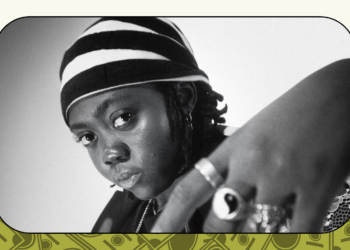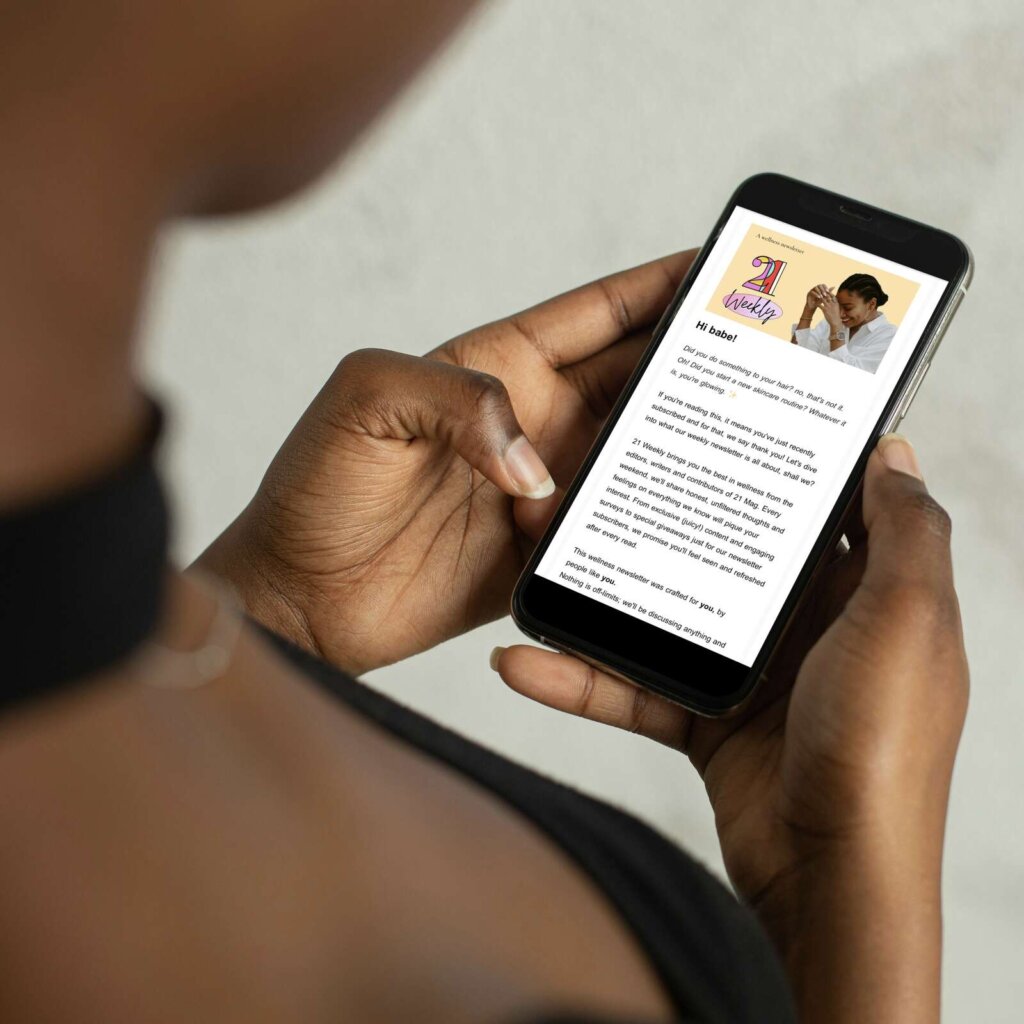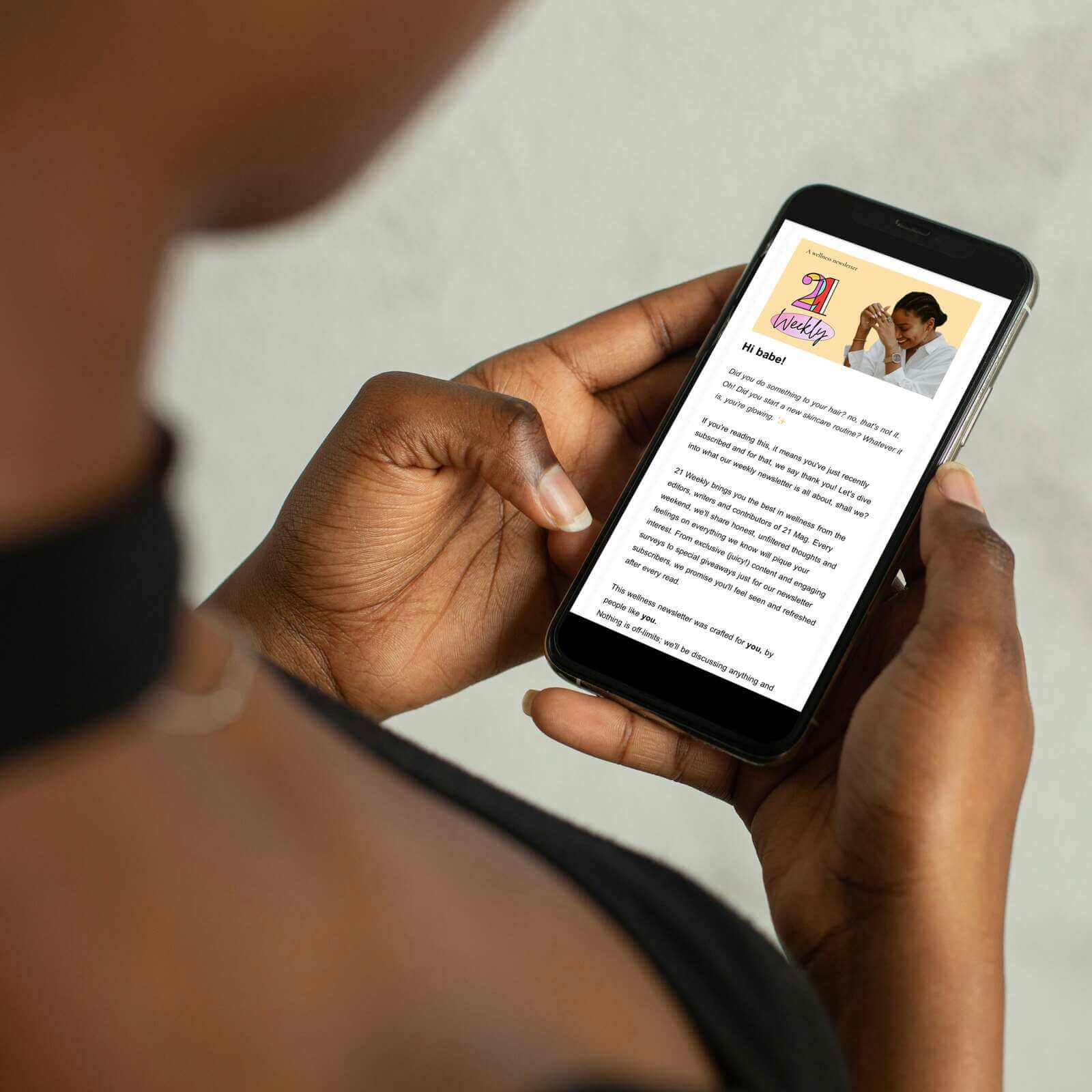No products in the cart.
Herstory: Cobi-Jane Akinrele on Founding Aké Collective
Herstory: Nigerian Women Founders is a 21 Magazine original series launched in March 2024 as a tribute to Women’s History Month. This captivating series delves into profound interviews with Nigerian women who have fearlessly founded brands and companies within the dynamic landscape of our economy. Through compelling narratives and insightful conversations, we illuminate the remarkable journeys, challenges overcome, and triumphant successes of these visionary leaders. Join us as we showcase the resilience, innovation, and impact of Nigerian women in shaping our shared future.
The Aké Collective is a health and wellness company dedicated to promoting wholesome, under-celebrated superfoods from Africa while inspiring moments of self-care and well-being.
Established in 2019, Aké Collective has forged partnerships with over 1000 farmers in Northeast Nigeria to source, process, and deliver superfoods directly to consumers. By following this approach, the brand ensures that a significant portion of the proceeds from each sale benefits the originating community.
In our Herstory series, we interviewed the founder of this impactful brand. Cobi-Jane Akinrele shared her personal journey, shedding light on her identity, mission, motivations, and unique approach to her work. She delved into anecdotes from her upbringing, the bold decisions she took in launching Aké Collective, her commitment to giving back to the community, and offered insights for women seeking to make a difference.
Keep reading to explore our insightful conversation.

Who is Cobi-Jane Akinrele?
My identity can best be described through a formative story from childhood. This story encapsulates the essence of my identity as Cobi-Jane. Born and raised in the United Kingdom, I faced several health challenges during my younger years, frequently visiting the renowned children’s hospital, Great Ormond Street, with my father.
When I was approximately three or four years old, my father often recounts an incident that occurred in the hospital’s reception area. The space was filled with toys and other children accompanied by their parents. Although I could walk, my gait was unsteady. As I wobbled towards a children’s book or toy, I lost my balance and fell. The other children, understandably, laughed at the sight. In response, the feisty four-year-old that I was stood up, asserted herself, and exclaimed, “Shut up!”
My Nigerian father, taken aback by my outburst, quickly carried me away, whispering, “You can’t say that to people.” I retorted, “Yes, I can; what are you going to do?”
This anecdote highlights significant aspects of my personality. I am not intentionally rude, but I am resolute in my convictions. Once I have made up my mind about something, I follow through, undeterred by potential embarrassment or the possibility of others laughing at me. Instead, I choose to confront such situations with a strong response. My parents often described me as headstrong, a trait I continue to embody, though its merits remain debatable.
If You Were to Say What Culture Had the Most Influence on Who You Are, I’m Guessing That Would be the British Culture?
I believe so.
I believe if I emphasise that I am Nigerian too frequently, people may perceive me as inauthentic. I identify myself as British-Nigerian, as I was born in the UK and did not reside in Nigeria until I completed my National Youth Service Corps (NYSC) at the age of 23. The immigrant experience in the UK is unique, so even when I refer to British culture, it is essential to note that I mean the British Nigerian immigrant culture, which is distinct in itself. It differs from Nigerians who moved to the UK for university or as adults.
Furthermore, I had a captivating childhood, which significantly influenced me. I grew up in a tiny town and attended a private boarding school. My education was imparted by nuns, some of whom attempted to act as moral guardians, resulting in a unique upbringing. Additionally, I pursued my higher education at a sheltered British university. Therefore, I would argue that the British Nigerian immigrant culture has had the most significant impact on me.
What was the Idea Behind Aké Collective?
In 2018, during my National Youth Service Corps (NYSC) tenure, I found myself drawn to the idea of staying in Nigeria and contributing to the country’s development. My initial plan was to create an agricultural business that would utilise drones to assist smallholder farmers, providing them with information about climate change and its impact on their yields. However, I soon realised that my tech-focused approach was not well-received by the farmers, who were more interested in financial empowerment rather than technological solutions.
Undeterred, I began to explore market-based projects that would appeal to my prospective buyers. This led me to Mile 12, where I discovered Fonio or Acha, a crop already gaining attention for its export potential. Fonio has a rich cultural history and is traditionally consumed during celebrations in Nigeria’s north-central and northeast regions, such as weddings, funerals, Salah, Christmas, and Easter. Unlike traditional cash crops, Fonio is primarily grown by women, who often do not own the land they work on. This allows them to engage in the market and gain more autonomy than if they were growing crops like maize or ginger, which are primarily traded by men.
Intrigued by this discovery, I conducted extensive research on Fonio, reaching out to people on Facebook and LinkedIn to inquire about processing and production. Despite the potential risks, I travelled to Jos to meet with a Fonio processor, marking the beginning of my journey in this field. The name ‘Aké’ was initially intended to represent the Agricultural Knowledge Exchange, but due to the lack of a knowledge exchange component in my approach, the name’s meaning was altered while keeping the ‘Aké’ moniker, which also means ‘axe’ in Yoruba.
Through my experiences, I have come to understand the importance of respecting the knowledge and practices of local farmers and adapting technological solutions to their needs rather than imposing them.
You Work With Only Women Farmers. That Wasn’t an Intentional Thing? It Wasn’t Like a Girl Power Move?
The primary reason I chose Fonio as a crop to cultivate is because it is predominantly women who cultivate it. I wanted to support a crop that would benefit women. While I did not approach this decision with a strictly strategic mindset, I was motivated by the desire to make a meaningful impact and work with a crop that held cultural significance.
Interestingly, my choice of Fonio has inspired some of the women we work with, as they see someone like themselves, often younger, taking on new challenges. When I give presentations, I emphasise the people behind the project, showcasing that they are ordinary individuals, not extraordinary beings. I encourage everyone to aspire to try new things.
Although our team primarily consists of women, we do not exclude men. This decision is strategic, as many social and cultural norms can hinder women’s participation if we were to work exclusively with them. For instance, some women may hesitate to join our network due to concerns about their marriages or financial autonomy.
To address this, we onboard both women and their husbands, should they wish to join. However, we make it clear that payment is made to the individual who has done the work. If a woman completes the work, she is the one who receives the payment. If her husband also wants to join our network and open an account, we welcome him. Still, we emphasise that payment is based on individual effort, not familial or social connections. This approach ensures a fair and inclusive system that supports the empowerment of women while also respecting cultural norms.
Maybe this is because of my background, but growing up in the UK, anything produced out of Nigeria other than Redeem Church and Wizkid was not seen as something of quality or something that one should aspire to. I don’t know if that’s still the same; the mindset that foreign things are better. To kind of challenge that narrative personally, I wanted to see if I could build a business from Nigeria, working with Nigerian products and then compete globally or serve a global market. That’s why I wanted something that had some cultural significance, too, because there’s no point saying that you want to promote Nigerian pride or products made in Nigeria if they are just knock-offs of what you find in the UK or US.
For example, if I said I’m going to start selling Matcha, how would that work? They don’t grow that here. I would be doing myself a disservice if I claimed to want to change the narrative that ‘Made in Nigeria’ can be different, have some global significance, and be meaningful if I’m just replicating what is done abroad. So, I wanted something that really had local significance.
Why Was it so Important for the Crop You Wanted to Grow to Have a Rich Cultural Heritage?
Growing up in the UK, my background may have influenced my perspective on anything produced in Nigeria beyond the realms of the Redeem Church and Wizkid, which were not regarded as high-quality or desirable. I am uncertain whether this mindset persists, but I wanted to challenge this narrative personally by exploring the possibility of building a business in Nigeria, working with local products, and competing on a global scale.
To make this vision a reality, I sought a product that held cultural significance, as promoting Nigerian pride or locally made products would be meaningless if they were merely replicas of what is available in the UK or US. For instance, if I were to start selling Matcha, it would not be feasible since it is not grown in Nigeria.
I wanted to ensure that my mission to change the narrative around “Made in Nigeria” products, which could have global significance and meaning, was not undermined by replicating what is already being done abroad. Instead, I aimed to find a product that held local significance.
Was There a Specific Deciding Moment When You Knew You Were Going to Do This for Real?
When the Mismanagement of Funds Became Evident
Upon my return from Jos to pursue my Master’s degree in the UK, I envisioned a setup where I could reside in the UK while conducting business in Nigeria through WhatsApp. However, the situation took a turn for the worse when financial discrepancies arose. Amid the challenges posed by the COVID-19 pandemic, instances of missing quantities during deliveries became a recurring issue. Customers would report shortages of 50 or even 100 kilograms, prompting inquiries to the Nigerian team, only to receive vague responses. The experience was bewildering.
In the midst of the pandemic, I made a swift decision to fly back to Jos to address the situation directly with my team. Despite the inherent risks, I had initially recruited the team remotely using platforms like LinkedIn and Zoom. Arriving at the Jos airport, I was met with unfamiliar faces, adding to the sense of uncertainty. Even the accommodation had been arranged through WhatsApp, underscoring the unconventional nature of the venture. Despite the risks involved, I chose to confront the challenges head-on.
The turning point came during our inaugural event, where I had the opportunity to interact with the farmers I had been collaborating with firsthand. Witnessing the direct impact on their lives through conversations with my field officers was a profound moment. After spending several months in Nigeria, the realisation dawned that these were not mere transactions but livelihoods at stake. The gravity of the situation hit home when I understood the expectations tied to the promises made to these individuals. It was at this juncture that the venture ceased to be a mere experiment and demanded a serious commitment from me. The choice between continuing the business or treating it as a passing diversion became clearer.
Can You Share Specific Examples of How Your Partnerships With Farmers in Northeast Nigeria Contribute to Both Cultural Celebration and Sustainable Entrepreneurship?
We prioritise a collaborative approach with our partner farmers, distinguishing us from the conventional model where individuals buy directly from farming communities for personal resale. Within our networks, we view farmers as partners, fostering a relationship built on mutual respect in trade. Our ethos revolves around equality; we do not hold ourselves above others nor expect to be revered as superior entities within the community. Instead, we operate as business allies deeply ingrained in the communities we serve.
To bolster community development, we facilitate the establishment of bank accounts and provide essential financial services at the expense of the business. Additionally, we offer guidance on trade and financial matters. Simultaneously, we also benefit from the community’s insights on optimal storage and processing techniques.
Our engagement with partner farmers transcends conventional sources of information, drawing from generational wisdom passed down through families. This heritage enriches our involvement in the community, emphasising our commitment to integration. Our field officers are residents of the partner or source communities, embodying our belief that Aké Collective is an integral part of the existing fabric in the North Central and North Eastern regions of Nigeria, where we operate primarily in Plateau State and Bauchi State.
We actively participate in community events, aligning with local harvesting practices and offering assistance as needed. Unlike commercial farming practices elsewhere, our approach mirrors the communal spirit found in villages, where collective efforts support individual farmers during harvests without charge. This reciprocal support system ensures that when it is your turn to harvest, the community stands ready to assist, fostering a sense of unity and celebration.
Can You Give Women Five Tips for Starting a Business in Nigeria?
I believe it’s important for individuals to consider my advice with a degree of scepticism.
Don’t Tolerate Bulls**t
This is my stance. If someone tells you that something cannot be accomplished in Nigeria, that statement is inaccurate. Why? It’s crucial not to make assumptions.
I’ve frequently encountered this scenario: concerning male founders, their ability to advance further is often attributed to their willingness to challenge the status quo. Even when faced with scepticism or claims that certain endeavours are not viable in Nigeria, they persist. Conversely, it’s common for us to retreat and accept defeat easily. It’s essential to break down barriers and confront obstacles head-on.
You Don’t Always Have to Prioritise Others’ Feelings
It’s important to acknowledge that as a business owner, founder, or CEO, your primary responsibility is to yourself. Following that, it’s to the business, then to the shareholders, and finally to the team. Avoid overly romanticising situations. When dealing with dissatisfied team members, it’s crucial to consider whether their discontent stems from systemic issues. Is it an isolated case or a broader concern affecting multiple team members?
Viewing responsibilities through this lens – prioritising oneself, shareholders, the business, and the team – can help remove emotional biases. Responsibility, in this context, entails ensuring the business operates smoothly. This involves ensuring fair compensation, timely payments, and opportunities for growth for the team. When these fundamental aspects are in place, individual feelings, including mine, become less significant.
If I’m feeling fatigued, the key question becomes: Am I effectively steering the ship? Am I maintaining my well-being and operating in a conducive environment? It’s not about fleeting emotions triggered by external comments. The ultimate goal is to remember why I embarked on this journey and who I aim to serve. Sometimes, people don’t need coddling; they require straightforward guidance.
My strong belief in this principle stems from a specific incident: within our workforce of 37 part-time factory workers, the need arose to appoint factory representatives. Despite unanimous support for a particular individual, let’s call her Alice, she hesitated due to language proficiency concerns. In such instances, it’s crucial to address underlying fears and insecurities while ensuring fair treatment, timely payments, and growth opportunities within the organisation.
Take Care of Your Well-being
Avoid overexerting yourself as it diminishes your ability to contribute effectively. Self-care is paramount; neglecting your well-being can lead to burnout, which may have long-lasting repercussions. I’ve experienced severe burnout periods, emphasising the importance of prioritising mental, physical, and emotional health. Remember, your well-being should take precedence over external expectations or pressures.
How Do You Navigate the Challenge of Introducing African Superfoods to a Broader Audience?
I am not entirely certain about my proficiency yet. However, I believe that building relationships with people within the target audience is crucial. It is also essential to understand that not everyone perceives or comprehends things the same way. For instance, a customer in Japan, where we have a client, may not use Fonio flour for “swallow” because they do not consume “swallow”, but the key is to meet people where they are and discuss relevant use cases. If pancakes are popular in their region, for example, we should emphasise how Fonio can be incorporated into that context.
Honestly, our most significant challenge, which I am currently addressing, is building trust. Some customers express initial satisfaction until they discover that we are based in Nigeria. At this point, they become anxious. This issue is being addressed by fostering relationships and ensuring that customers feel confident in us as suppliers. This may involve me or someone from the sales and administrative team participating in a call or providing some form of reassurance. Additionally, sending out samples beforehand, especially for larger orders, can be beneficial. Unfortunately, there is still a lingering perception that businesses headquartered in Nigeria are less trustworthy, and we are working diligently to overcome this stereotype.
How Do You Envision the Role of Aké Collective in Inspiring Moments of Self-Care and Well-Being?
Our products offer our customers the opportunity to prioritise rest and relaxation, thanks to their carefully selected ingredients, which have been recognised for centuries for their soothing and calming properties.
While I cannot make explicit health claims, our teas have been known to help reduce blood pressure, stress, and anxiety and improve sleep.
These benefits go beyond what one might experience from simply drinking a glass of water or soda which is why we encourage the use of tea as part of a daily routine.
We also advocate for the consumption of minimally processed foods that have long been used in traditional and local remedies. For instance, our flagship product, Fonio has a low glycemic index, making it an excellent alternative to rice for individuals with diabetes.















